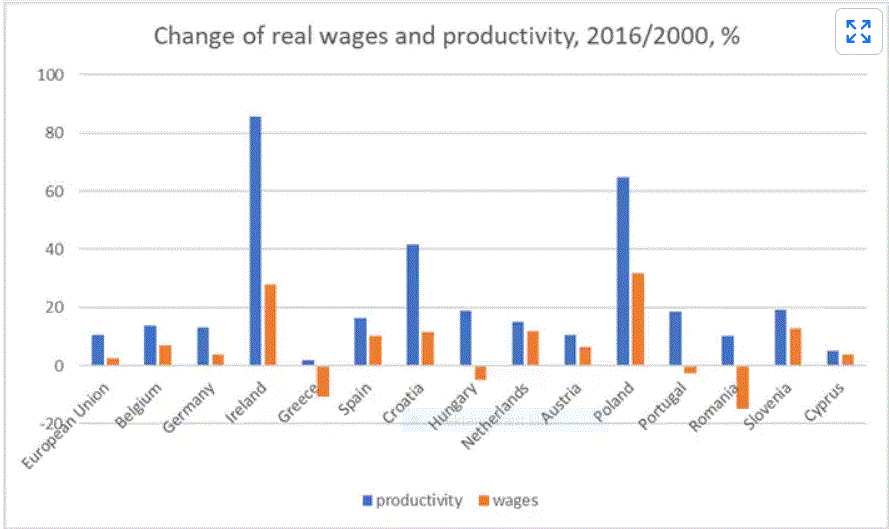I de seneste 20 år har lønningerne slet ikke fulgt med produktivitetsudviklingen. Med øget inflation og voksende ulighed, er omfordeling af værdierne kommet øverst på den politiske dagsorden. Det ses i f.eks. Japan og UK. Det er kun de første skridt til en forbedring af lønmodtagerne situation, vurderer Saxo Banks makroøkonomiske chef, Christopher Dembik, i en analyse. Det kan føre til en særdeles kraftig debat om en omfordeling af værdierne. Japan lægger op til en ny japansk-orienteret kapitalisme, der skal bremse uligheden. UK lægger op til et samfund med højere lønninger. I Frankrig og Tyskland er minimumslønninger kommet på dagsordenen, og fagforeningerne begynder at kræve højere lønstigninger end hidtil. Der har været et økonom-forslag om en éngangsskat på formuer, f.eks. 25 pct., men det er der næppe tilslutning til. Derimod må der skabes en overensstemmelse mellem produktivitetsforbedringer og lønninger. Under alle omstændigheder er en form for omfordeling blevet en nødvendighed for at afværge den “kulturkrig”, som Saxo Bank mener, de moderne samfund står i, f.eks. mellem unge og ældre og mellem den øverste procent i toppen og resten. Hvis der ikke sker en vis omfordeling, er der risiko for omvæltninger som med De gule Veste i Frankrig.
It’s time for redistribution of wealth
Summary: Over the past twenty years, real compensation has lagged behind labor productivity growth in most developed countries. But with more persistent inflationary pressures and calls to fight inequality, several governments have embraced redistribution of wealth as a top policy priority. This is the case of Japan and the United Kingdom, for instance. More will follow. We expect that redistribution of wealth and salary increases will be subjects of intense public debate, even in countries where the unemployment rate is high and the balance of power is unfavorable to workers, in theory.
Over the past few days, policymakers have embraced redistribution of wealth as a top priority :
– The new Japanese Prime Minister, Fumio Kishida, har promised he will prioritize boosting wages through tax incentives, rather than imposing higher levies on capital gains and dividends. This is still unclear. But it seems companies which will increase salaries will be able to benefit from some kind of tax exemptions. He has also unveiled a specific plan to introduce pay hikes for nurses, care workers and childcare workers who are « underpaid for the amount of work they do ».
This new policy priority aims to promote a « new Japanese-style capitalism ». It also aims to revert the negative effects of the structural reforms introduced in the early 2000s under the government of Junichiro Koizumi. These reforms, especially higher reliance on market mechanisms (minkatsu, in Japanese), reinforced the country’s competitiveness but widened the income gap too.
– In the United Kingdom, the Prime Minister Boris Johnson declared his government plans to build a « high-skill, high-wage » economy across the country. This won’t be easy. It will require a major shift in the way British businesses work. Many sectors will need to reduce their reliance on cheap foreign labor, especially in health and services.
– In France, the candidate of the Socialist Party for the 2022 April presidential election, Anne Hidalgo, proposed to boost the minimum wage by 10 to 15%. On 1 October, it increased by 2.2%. The gross minimum wage currently stands at 1 554.58€. It would be between 1710,03€ and 1787,76€ if Hidalgo’s measure is enacted.
However, she has not explained how the increase would be financed and whether it would be part of negotiations between the government, the business representatives and the trade unions. Such an increase would theoretically require a large political consensus – which is not the case yet. At the beginning of September, she proposed to double the salaries of teachers, which are among the lowest in the European Union, notably at the start of their career.
– In Germany, the public sector trade unions ask for a 5% pay rise. Last time, it ended in a 3.2% increase spread over nearly three years. But inflation was much lower than now. It is hovering at the highest level since 1992, at 4.1% YoY in September. Expect salary rises to become a broader political topic and to be fully part of the ongoing coalition government negotiations between the center-left CDU, the Greens and the pro-business FDP.
Calls for redistribution of wealth are not surprising, in our view. After every single economic crisis, inequalities tend to be on the rise. In June 2020, the Harvard economist Ian Kumekawa wrote an opinion paper in the Financial Times to revisit the idea of Pigou wealth tax.
After the First World War, the British economist Arthur Victoria Cecil Pigou Pigou called for a huge, one-time levy of 25% on all wealth, exempting the poor, to pay for a skyrocketing wartime bill. At that time, it was also considered as a way for the very affluent to share more equitably the burden of the unexpected crisis. The Pigou wealth tax was not introduced. Nowadays, there is not enough political and public support to introduce it either.
Actually, governments are acting the other way around. Perhaps, they will raise taxation for the wealthiest. But their core idea is to find ways to increase redistribution of wealth and especially salaries. Over the past two decades, real wage increases have been lagging behind labor productivity growth (calculated as follows : GDP/worker worked) in almost all the developed countries.
According to the AMECO database of the European Union, labor productivity increases were four times higher than increase in real compensation in the EU28 between 2000 and 2016. There are major disparities between member countries, sometimes. Labor productivity increased three times more than wages in Germany and Croatia, and two times more in Poland and Austria over the period, for instance. In Hungary, Romania and Greece (for obvious reasons), real compensation decreased while real labor productivity increased (see below chart). Rebalancing is needed.

Source: real compensation/worker, real productivity per worker (AMECO, 2018)
We are in a unique period of history. This is how our CIO Steen Jakobsen has defined this new period in his latest emails to clients:
We are now into early phases of a “Culture War” between young vs old, state vs. private ownership, privacy rights vs. all dominant “platforms”, freedom of speech vs. dictated political correctness, educated vs. uneducated, home ownership vs. renters, rentiers vs. productive alternatives, tunnel thinking-narratives vs. open societies, but not least productive vs. non-productive (in some cases zombies companies dragging our economy’s potential down).
The so-called “Culture War” opposes workers and shareholders but also the top 1 (or 10% in some countries) to the rest of the population.
Redistribution of wealth will be a major economic trend in the coming years, in our view. The real risk that inflation will remain uncomfortably high longer than the central banks expect and wish will help unleash fairer distribution of wealth and better salaries (see our analysis on the structural trends behind high inflation). But it is not certain that rising wages will be enough to outpace inflation. In the United Kingdom, this is not the case for now.
If governments but also employers fail to address these issues, expect the 2018 Yellow Vest Movement to revive and to spread, in some form or another, across Europe. The social contract is already broken. A worsening inflation pinch is likely to make people angry, in the first place the have-nots.











